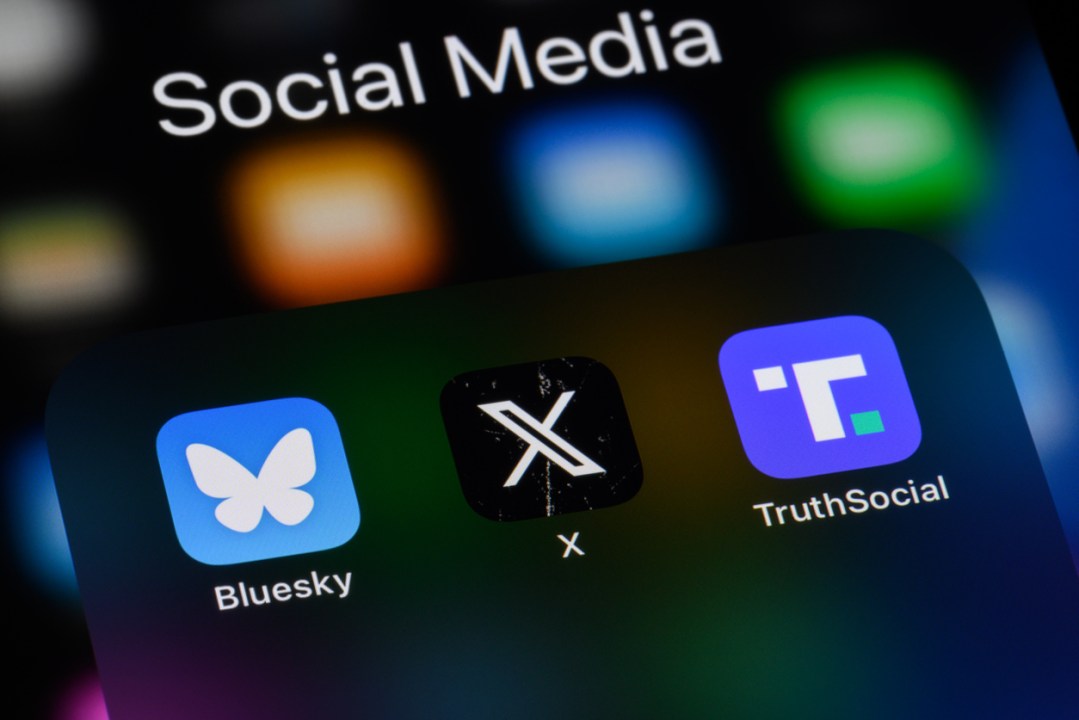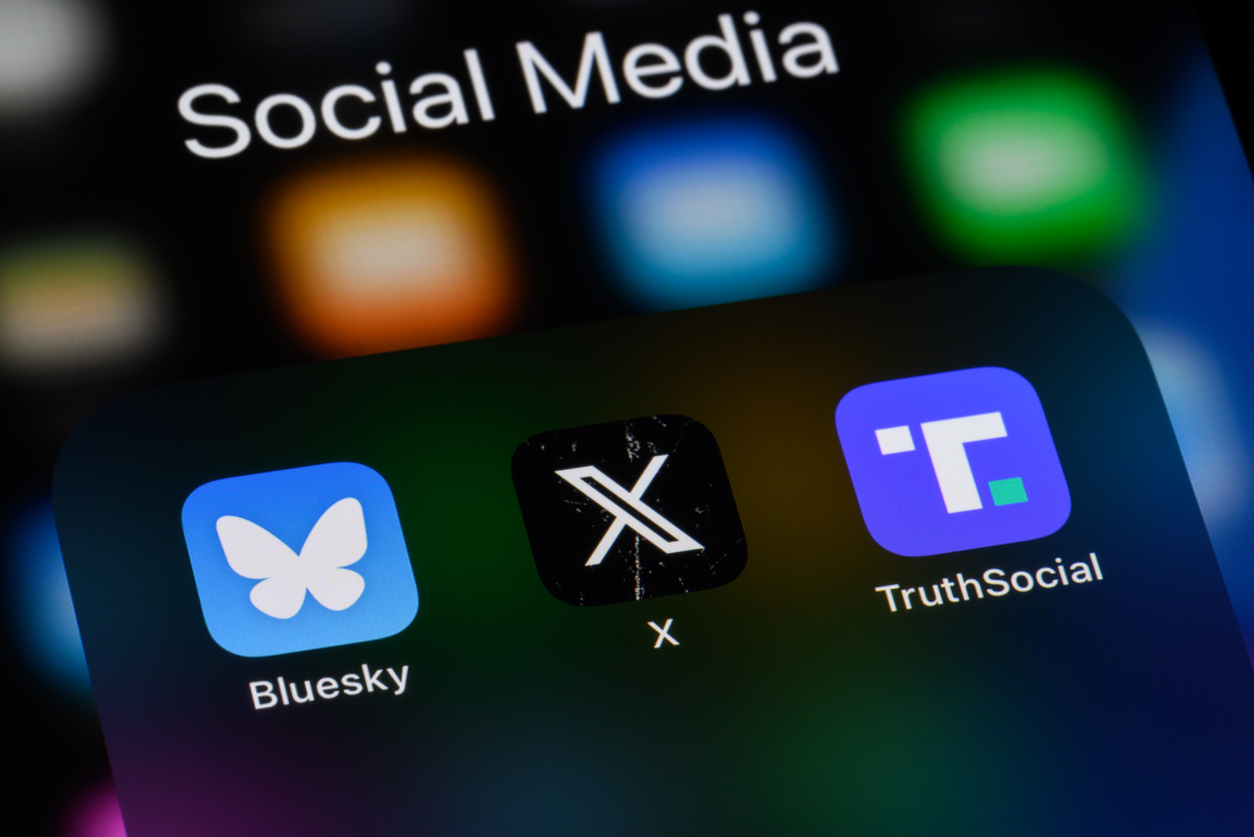In the middle of Cairo there’s a place called the City of the Dead. It is a dusty sprawl of mausoleums, sepulchres and crumbling Mameluke tombs, that has housed the corpses of the city for over a thousand years. On a dank winter’s dusk, it feels especially lifeless – deformed dogs vanish into shadows, random fires burn vile rubbish. But that’s when you notice children’s toys. Cheap clothes drying outside a tomb. And you realise, with a shudder: my God, some poor people live here. That, roughly, is the vibe on Bluesky today.
Ironically, Bluesky is now much nastier than Twitter
In case you’ve forgotten, Bluesky is the social media platform once seen as the great Twitter replacement. A year ago, after Elon Musk took over Twitter, unbanned a host of right-wing voices, changed the name (irritatingly) to X, and then allegedly began doing Hitler salutes in the canteen, many people took offence and decamped to Bluesky.
Of course, Bluesky wasn’t the first attempt to replace Twitter. Do you remember Mastodon? You probably don’t, because joining it required a PhD in computer science. First you had to choose a server, then you tried to communicate with the seven other users in your digital iso-pod, but they could only message you every second Thursday, probably from space. It wasn’t a social medium so much as a social micro-coffin.
Bluesky, however, had two big advantages over the other Twitter alternatives. First: it was basically identical to Twitter – so much so, it looked like a rip-off, akin to a cheap Rolex in Bangkok. It was easy to join, and easy to use, even if posts were called ‘skeets’, a word that sounds like an unfortunate accident in one’s pants. ‘I just did a skeet. Sorry.’
Secondly – and crucially – Bluesky gained early momentum, especially during Trump’s rise, which gave it an aura of viability and seriousness. It was benefitting from the network effect – which is when a product becomes more valuable as more people use it. Like a party that gets better and better as more friends show up.
At the height of its early surge, lots of people showed up for Bluesky. In a matter of months it grew from a few hundred thousand users to maybe 36 million, most of them Muskphobic refugees streaming across the digital Dnieper from Twitter, along with the merely curious.
I was one of the latter. In those heady early days – when the sky was the limit for Bluesky – a lot of not-very-leftwing people like me snuck over to have a look at the new place. I didn’t leave Twitter/X, but I checked out the fresh offering.
I had good reasons for this. Many of the voices I liked on Twitter were leaving for Bluesky, taking their valuable weirdness with them. Often they were completely non-political – cricket nerds, wine enthusiasts, German archaeologists. One day they were filling my feed with jokes, Ashes stats and pre-ceramic gossip, the next day they were gone. Twitter was poorer as a result. So I joined Bluesky to find them again. Also, it seemed Bluesky might genuinely replace Twitter, and I wanted to be prepped with an account, if the big switcheroo happened.
However, as soon as I looked around Bluesky, I sensed it wouldn’t work. It didn’t yet feel like a desolate vale of inhabited sepulchres – it was more like a bad vegan café, full of humourless puritans with mouths like cats’ bottoms, eager to congratulate themselves on how much better and nobler they were than the awful centrists back on Twitter. (Right-wing people were, of course, beyond discussion – unmentionably evil). It wasn’t very inviting for people like me. And so, even then, I had the notion: Bluesky is going to fail.
And thus it is. As I write, Bluesky is dying – turning into the City of the Dead. On virtually all metrics it is sliding down a slope that threatens to become a cliff, as a reverse network effect kicks in. For example, in terms of unique daily posts, Bluesky peaked at 1.5 million posts per day in late 2024, but is now down to 700,000 – and the trend looks solid. Over the same period, daily ‘likes’ are down from 2.7m to 1.5m. And still it slides.
This kind of decay is disastrous for a social medium – because it is self-fulfilling. As the site shrinks down to a hardcore of tedious, earnest people, so these people will turn viciously on each other, out of sheer boredom – lacking anyone else to spar with (ironically, Bluesky is now much nastier than Twitter). In this way the site becomes even less appealing.
The end of all this is what we witness today: a kind of morbid silence. You can spend a day among the tombs of Bluesky and the only sign of life is a feeble joke in the afternoon. Maybe a meme falls, silently and unnoticed, like a snowflake on a gravestone.
Tellingly, several big names who moved to Bluesky have quietly returned to X. Quintessential Centrist Dad and Times journalist Hugo Rifkind is one – at least he’s honest enough to admit the reason (‘Bluesky is dull’). As for large organisations, it’s noticeable that the Guardian staged a performative departure from Twitter to Bluesky, yet virtually all its star writers – from Owen Jones to John Harris – sensibly stayed put. I bet the Guardian itself will return, in time.
These people are dreadful – shrill, humourless, dour. We don’t want them back
All of which leads to the question – should we care? If Bluesky dies and the Blueskiers slink back to Muskville, is that a problem? I think it is.
For one thing, Bluesky currently functions as a kind of philosophical quarantine zone. It’s a safe place where the most politically infected can stew among themselves. Yes, they grow sicker and more misinformed, but that’s all the more reason to keep them there. These people are dreadful – shrill, humourless, dour. We don’t want them back. We must therefore take action to save their ghetto. But what?
Here is where another historical analogy might be useful. It’s said that during the Black Death, villagers on Dartmoor would leave food on remote rocks – so that the pestiferous people up in the hills didn’t have to descend into the settlements to survive. The plague was kept at altitude, where it belonged. I propose we do the same for Bluesky. Every so often, one of us – the sane, the informed, the occasionally funny – must venture into the eerie cemetery of Bluesky, and leave behind a little sustenance: a decent gag, a nugget of insight. Just enough to keep the infected entertained. Just enough to keep them from returning to civilisation.








Comments